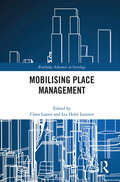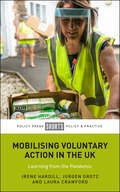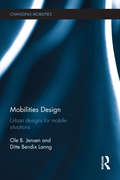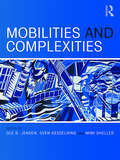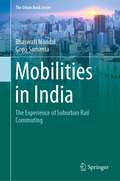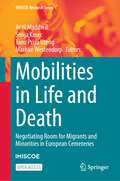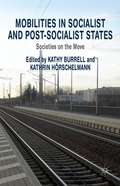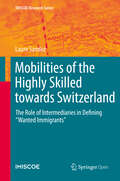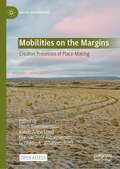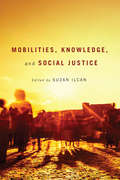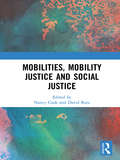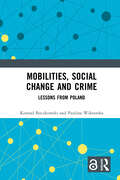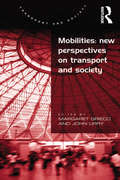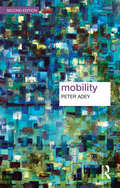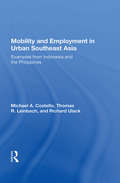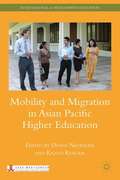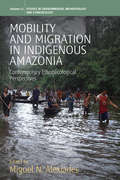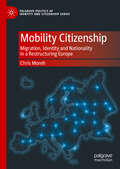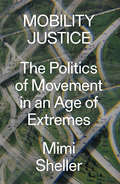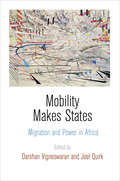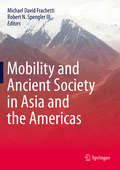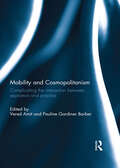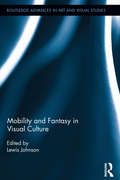- Table View
- List View
Mobilising Place Management (Routledge Advances in Sociology)
by Claus LassenMobilizing Place Management makes an important contribution to the mobilities field by arguing for the need to rethink place management. It takes a point of departure in the mobilities turn and relational place thinking while exploring the relationship between place and mobility. In a world of increasing mobility and global competition between nations, cities and urban regions, the managing of places seems more relevant than ever before. By examining various examples of place and mobilities that range from the airport, rural village, tourist site, port-city to the city region, this book argues that the management of places can be informed and enhanced by installing a greater awareness and understanding of mobility. This insight could potentially improve the ability of current place management to translate a relational and mobilities-orientated thinking into concrete actions, instructions, interventions, designs, plans, policies and management control systems. The book will be essential reading for researchers, practitioners and students in the field of place management and across urban studies, planning, design, geography, sociology, tourism, transport and history.
Mobilising Voluntary Action in the UK: Learning from the Pandemic
by Irene Hardill, Jurgen Grotz and Laura CrawfordEPDF and EPUB available Open Access under CC-BY licence. The COVID-19 pandemic transformed the landscape of voluntary action. Some volunteering projects had to be paused, while others were delivered in different ways, but across all four UK nations large numbers of people began volunteering for the first time. This book provides an overview of the constraints and opportunities of mobilising voluntary action across the four UK nations during the pandemic. Sector experts and academics examine the divergent voluntary action policy frameworks adopted, the state and non-state supported volunteer responses, the changes in the profile of volunteers and the plans to sustain their involvement. This book addresses the urgent policy and practice need for evidence-based considerations to support recovery from the pandemic and to prepare for future emergencies.
Mobilities Design: Urban Designs for Mobile Situations (Changing Mobilities)
by Ole B. Jensen Ditte Bendix LanngContemporary society is marked and defined by the ways in which mobile goods, bodies, vehicles, objects, and data are organized, moved and staged. Against the background of the ‘mobilities turn’ this book articulates a new and emerging research field, namely that of ‘mobilities design’. The book revolves around the following research question: How are design decisions and interventions staging mobilities? It builds upon the ‘Staging Mobilities’ model (Jensen 2013) in an exploratory inquiry into the problems and potentials of the design of mobilities. The exchange value between mobilities and design research is twofold. To mobilities research this means getting closer to the ‘material’, and to engage in the creative, exploratory and experimental approaches of the design world which offer new potential for innovative research. Design research, on the other hand, might enter into a fruitful relationship with mobilities research, offering a relational and mobile design thinking and a valuable basis for design reflections around the ubiquitous structures, spaces and systems of mobilities.
Mobilities and Complexities
by Mimi Sheller Ole B. Jensen Sven KesselringThe new ‘mobilities turn’ has become a powerful perspective in social theory. John Urry’s oeuvre has been very influential in the emergence of this new field and has had lasting impacts on many scholars. This collection presents originally commissioned essays from leading scholars in the field who reflect on how Urry’s writing influenced the course of their research and theorizing. This volume gathers contributions in relation to John Urry’s path-breaking work. The new ‘mobilities turn’ made a strong imprint in European social theory and is beginning to make an impact in the Americas and Asia as well. It challenges mainstream theoretical and empirical approaches that were grounded in a sedentary and bounded view of states. It propels innovative thinking about social and media ecologies, complex systems and social change. It bridges many disciplines and methodologies, leading to new approaches to existing problems while also resonating with questions about both history and the future. Mobilities research marks the rise of academic and intellectual cooperation and collaboration ‘beyond societies’, as nations around the world face the ecological limits of contemporary mobility and energy systems. The contributors represent several national contexts, including England, Germany, Denmark, Finland, Taiwan, Brazil, Canada, Australia and the USA. This book collects personal essays and gives insight into a vivid network of scientists who have connections of various degrees to the late John Urry as an academic figure, an author and a person.
Mobilities in India: The Experience of Suburban Rail Commuting (The Urban Book Series)
by Gopa Samanta Bhaswati MondalThis book presents commuting as a new paradigm in mobility studies in the context of global south. It delves into suburban train commuting in Eastern India. The book interprets commuting not only as a means to attend work but also as a process producing kinetic event-space infused with different mobile practices, which is not determined by their locational fixity, rather can be cognized. It analyses the role of suburban train commuting in the metropolitan expansion of Kolkata, and the transformation of rural space into urban. The significant contribution of the book lies in explaining commuters’ experiencescape and the production of spatial fluidity in time capsule through commuting. It also explores the subjective reality of gendered commuting. The book uses a trans-disciplinary research design, blending quantitative and ethnographic research methods. The area selected for the empirical research is the Howrah-Bardhaman Main Railway Line (108 km), the first suburban railway line in Eastern India. Commuters originating from three adjacent districts of Purba Bardhaman, Hooghly and Howrah took part in this research. Besides the commuters, non-commuting passengers and hawkers in the train were also interviewed to understand the diverse perceptions of the process of commuting. This book may be considered as a reference book for mobility studies, transport studies, urban geography and regional planning.
Mobilities in Life and Death: Negotiating Room for Migrants and Minorities in European Cemeteries (IMISCOE Research Series)
by Avril Maddrell Tanu Priya Uteng Mariske Westendorp Sonja KmecThis open access book focuses on migrant and minority cemetery needs through the conceptual lens of the mobilities of the living and the dead. In doing so, the book brings migration and mobility studies into much-needed dialogue with death studies to explore the symbolically and politically important issue of culturally inclusive spaces of cemeteries and crematoria for migrants and established minorities. The book addresses majority and minority cemetery and crematoria provisions and practices in a range of North West European contexts. It describes how the planning, management and use of cemeteries and crematoria in multicultural societies can tell us about the everyday lived experiences of migration and migrant heritage, urban diversity, social inclusion and exclusion in Europe, and how these relate to migrant and minority experience of lived citizenship, practices of territoriality and bordering, colonial/postcolonial narratives. The book will be of interest to readers in the fields of migration/mobilities studies and death studies, as well as policy makers and practitioners, such as local government officers, cemetery managers and city planners.
Mobilities in Socialist and Post-Socialist States
by Kathy Burrell Kathrin HörschelmannThis edited collection explores what mobility meant, and means, in the specific contexts of socialist and post-socialist Soviet and East European societies. Under the socialist regimes, mobility was at the heart of everyday interactions with the state, from controls on travel and communications mobilities to daily experiences of transport usage and the immobility of queuing for goods at times of shortages. These mobilities have been reshaped under post-socialist regimes. While the collapse of socialism heralded a liberalization of international migration and increased automobility, new experiences of poverty, unemployment, and in the case of some states, war, plus the loss of subsidized travel greatly reduced fields of mobility. Bringing together contributors from the dynamic fields of Mobilities and Socialist/Post-Socialist Studies this book uses the focus on socialist and post-socialist mobilities to investigate fundamental intersections of power, control, resistance and inequality.
Mobilities of the Highly Skilled towards Switzerland: The Role of Intermediaries in Defining “Wanted Immigrants” (IMISCOE Research Series)
by Laure SandozThis open access book analyses the strategies of migration intermediaries from the public and private sectors in Switzerland to select, attract, and retain highly skilled migrants who represent value to them. It reveals how state and economic actors define “wanted immigrants” and provide them with privileged access to the Swiss territory and labour market. The analysis draws on an ethnographic study conducted in the French-speaking Lake Geneva area and the German-speaking northwestern region of Switzerland between 2014 and 2018. It shows how institutional actors influence which resources are available to different groups of newcomers by defining and dividing migrants according to constructed social categories that correlate with specific status and privileges. This research thus shifts the focus from an approach that takes the category of highly skilled migrant for granted to one that regards context as crucial for structuring migrants’ characteristics, trajectories, and experiences. Beyond consideration of professional qualifications, the ways decision-makers perceive candidates and shape their resource environments are crucial for constructing them as skilled or unskilled, wanted or unwanted, welcome or unwelcome.
Mobilities on the Margins: Creative Processes of Place-Making (Arctic Encounters)
by Katrín Anna Lund Gunnar Thór Jóhannesson Björn Thorsteinsson Guðbjörg R. JóhannesdóttirThis open access book examines places on the margins and the dynamics through which a marginal position of a place is created. Specifically, it explores how places, mostly in sparsely populated areas, often perceived as immobile and frozen in time, come into being and develop through interference of everyday mobilities and creative practices that cut across the spheres of culture and nature as usually defined. Through fieldwork and case studies from areas in Iceland, Finland, Greenland, and Scotland, the book’s twelve chapters draw out the multiple relations through which places emerge, where people compose their lives as best they can with their surroundings. A special concern is to explore the links between travelling, landscape, and material culture and how places and margins are enacted through mobilities and creative practices of humans and other beings. The emphasis on mobility disturbs the perception of a place as a bounded entity and offers a useful and necessary understanding of places as mobile and fluid. Mobilities on the Margins is a novel and timely contribution to the exploration of human and more-than-human interactions in a world of increasingly fluid mobilities and insistent crises.
Mobilities, Knowledge, and Social Justice
by Suzan IlcanThe mobility of people, objects, information, ideas, services, and capital has reached levels unprecedented in human history. Such forms of mobility are manifested in continued advances in communication and transportation capacities, in the growing use of digital and biometric technologies, in the movements of Indigenous, migrant, and women's groups, and in the expansion of global capitalism into remote parts of the world. Mobilities, Knowledge, and Social Justice demonstrates how knowledge is mobilized and how people shape, and are shaped by, matters of mobility. Richly detailed and illuminating essays reveal the ways in which issues of mobility are at the centre of debates, ranging from practices of belonging to war and border security measures, from gender, race, and class matters to governance and international trade, and from citizenship and immigration policies to human rights. Contributors analyze how particular forms of mobility generate specific types of knowledge and give rise to claims for social justice. This collection reconsiders mobility as a key term in the social sciences and humanities by delineating new ways of understanding how mobility informs and shapes lives as well as social, cultural, and political relations within, across, and beyond states. Contributors include Rob Aitken (Alberta), Tanya Basok (Windsor), Janine Brodie (Alberta), William Coleman (Waterloo), Ronjon Paul Datta (Alberta), Karl Froschauer (Simon Fraser), Daniel Gorman (Waterloo), Amanda Grzyb (Western), Suzan Ilcan (Waterloo), Eleonore Kofman (Middlesex), Anita Lacey (Auckland), Theresa McCarthy (Buffalo), Daniel J. Paré (Ottawa), Nicola Piper (Sydney), Parvati Raghuram (Open), Kim Rygiel (Wilfrid Laurier), Leslie Regan Shade (Toronto), Sandra Smeltzer (Western ), Daiva Stasiulis (Carleton), Myra Tawfik (Windsor), and Lloyd Wong (Calgary).
Mobilities, Knowledge, and Social Justice
by Suzan IlcanThe mobility of people, objects, information, ideas, services, and capital has reached levels unprecedented in human history. Such forms of mobility are manifested in continued advances in communication and transportation capacities, in the growing use of digital and biometric technologies, in the movements of Indigenous, migrant, and women's groups, and in the expansion of global capitalism into remote parts of the world. Mobilities, Knowledge, and Social Justice demonstrates how knowledge is mobilized and how people shape, and are shaped by, matters of mobility. Richly detailed and illuminating essays reveal the ways in which issues of mobility are at the centre of debates, ranging from practices of belonging to war and border security measures, from gender, race, and class matters to governance and international trade, and from citizenship and immigration policies to human rights. Contributors analyze how particular forms of mobility generate specific types of knowledge and give rise to claims for social justice. This collection reconsiders mobility as a key term in the social sciences and humanities by delineating new ways of understanding how mobility informs and shapes lives as well as social, cultural, and political relations within, across, and beyond states. Contributors include Rob Aitken (Alberta), Tanya Basok (Windsor), Janine Brodie (Alberta), William Coleman (Waterloo), Ronjon Paul Datta (Alberta), Karl Froschauer (Simon Fraser), Daniel Gorman (Waterloo), Amanda Grzyb (Western), Suzan Ilcan (Waterloo), Eleonore Kofman (Middlesex), Anita Lacey (Auckland), Theresa McCarthy (Buffalo), Daniel J. Paré (Ottawa), Nicola Piper (Sydney), Parvati Raghuram (Open), Kim Rygiel (Wilfrid Laurier), Leslie Regan Shade (Toronto), Sandra Smeltzer (Western ), Daiva Stasiulis (Carleton), Myra Tawfik (Windsor), and Lloyd Wong (Calgary).
Mobilities, Mobility Justice and Social Justice
by Nancy Cook David ButzThis book offers a cutting-edge overview of mobility, mobility justice and social justice, with contributions from a broad range of leading scholars. Mobility justice is understood as a way to frame the entanglements of power and social exclusion in the mobilities of humans, things, and ideas, as well as to differential and unequal access to movement, and the ability to move. The introductory chapters firmly ground the concept of mobility justice and social justice, with the proceeding chapters covering a range of topics from race, sexuality, ferry justice and aeromobility justice, animal mobilities, design, and food mobilities.
Mobilities, Social Change and Crime: Lessons from Poland
by Konrad Buczkowski Paulina WiktorskaThis book presents a synthesis of selected trends in the dynamics and structure of crime in Poland over the past 30 years, in the context of ongoing social transformations in the wider region. The book explores the impact of the deep systemic transformation of the late 1980s and early 1990s on the phenomenon of crime, its structure and dynamics, and the policy of its control in the following decades. It also examines the impact of changes resulting from the dynamic development of Polish society in the 21st century in the context of global changes towards the emergence of a new form of collective life, a mobile information society based on modern technologies. The focus is primarily on those deviant behaviours that can most obviously be linked to social changes, primarily political, economic, legal, and technological. The work examines disclosed crime figures available in official statistics. It also looks to the future considering the global societal changes caused by the outbreak of the COVID-19 pandemic. Based on preliminary observations made in selected countries, the authors describe associated changes in criminal behaviour and identify some pivotal developments that may influence future trends. The book will be of interest to academics and researchers working in the areas of criminal law, criminology, sociology and criminal policy.
Mobilities, Social Change and Crime: Lessons from Poland
by Konrad Buczkowski Paulina WiktorskaThis book presents a synthesis of selected trends in the dynamics and structure of crime in Poland over the past 30 years, in the context of ongoing social transformations in the wider region. The book explores the impact of the deep systemic transformation of the late 1980s and early 1990s on the phenomenon of crime, its structure and dynamics, and the policy of its control in the following decades. It also examines the impact of changes resulting from the dynamic development of Polish society in the 21st century in the context of global changes towards the emergence of a new form of collective life, a mobile information society based on modern technologies. The focus is primarily on those deviant behaviours that can most obviously be linked to social changes, primarily political, economic, legal, and technological. The work examines disclosed crime figures available in official statistics. It also looks to the future considering the global societal changes caused by the outbreak of the COVID-19 pandemic. Based on preliminary observations made in selected countries, the authors describe associated changes in criminal behaviour and identify some pivotal developments that may influence future trends. The book will be of interest to academics and researchers working in the areas of criminal law, criminology, sociology and criminal policy.
Mobilities: New Perspectives On Transport And Society (Transport and Society)
by John UrryBringing together the leading authors currently working at the intersection of social science and transport science, this volume provides a companion to the well-established and extensive international Transport and Society series. Each chapter, and the volume as a whole, offers closer and richer consideration of the issues, practices and structures of multiple mobilities which shape the current world but which have typically been overlooked or minimised. What this approach seeks to do is not only draw attention to many new areas of research and investigation relating to mobile lives, but also to point to new theories and methods by which such lives have to be researched and examined. Such new theories and methods are relevant both to rethinking 'transport' studies as such but are also recasting 'societal' studies as 'transport' so that it comes out of the ghetto and enters mainstream social science.
Mobility (Key Ideas in Geography)
by Peter AdeyMobility aims to take the pulse of this enormously expanded and energetic field. It explores the breadth of the disciplinary areas mobility studies now encompass, examining the diverse conceptual and methodological approaches wielded within the field, and explores the utility of mobility to illuminate a cornucopia of mobile lives: from the mass movements of individuals within global processes such as migration and tourism, to homelessness and war; from the entangled relations caught up in the movement of disease, people and aid across borders, to the inability of someone to cross over a road. The new edition explores the more sustained elaboration of mobility studies within a wide variety of disciplinary approaches and subject matters. It echoes the growing internationalization of mobility research, reflected in diverse case studies from the Global South, South Asia, Latin America, the Caribbean and so far under-represented perspectives from China, Australasia, post-socialist Eastern Europe, the Middle East and elsewhere. The book also features an additional chapter on mobility studies, to survey and explore the diverse quality of the field, and methodologies, in order to reflect the growing diversity of methodological approaches to mobilities, from walk-alongs and critical cartography to the mobile arts. The book offers an accessible reading of the way mobility has been tackled and understood, neatly exploring and summarizing a topic that has exploded into different variations and nuances. The text allows scholars and students alike to grasp the central importance of ‘mobility’ to social, cultural, political, economic and everyday terrains by providing accessible writings on key authors within key ideas and case study boxes, suggested further readings and summaries, while at the same time making a significant contribution to scholarly writings and debates.
Mobility And Employment In Urban Southeast Asia: Examples From Indonesia And The Philippines
by Michael A. CostelloThis study represents a new generation of inquiry that attempts to gain a better understanding of smaller urban places in the remote and frontier regions in Southeast Asia. A set of intriguing hypotheses attempting to unravel the complicated relationships between population movements and employment opportunities as they relate to the growth of certain urban places and the rural hinterland have been posited. The study is aimed at illuminating the processes of urbanization and development in North Sumatra Province of Indonesia and the Central Visayas and Northern Mindanao regions of the Philippines.
Mobility And Migration In Asian Pacific Higher Education
by Deane E. Neubauer Kazuo KurodaThrough case studies in eight Asian countries, Europe, and the United States, this volume explores the range and consequences of increased mobility within Asia-Pacific higher education and the patterns of migration emerging for persons, ideas, institutions, and practices.
Mobility And Migration In Indigenous Amazonia
by Miguel N. AlexiadesContrary to ingrained academic and public assumptions, wherein indigenous lowland South American societies are viewed as the product of historical emplacement and spatial stasis, there is widespread evidence to suggest that migration and displacement have been the norm, and not the exception. This original and thought-provoking collection of case studies examines some of the ways in which migration, and the concomitant processes of ecological and social change, have shaped and continue to shape human-environment relations in Amazonia. Drawing on a wide range of historical time frames (from pre-conquest times to the present) and ethnographic contexts, different chapters examine the complex and important links between migration and the classification, management, and domestication of plants and landscapes, as well as the incorporation and transformation of environmental knowledge, practices, ideologies and identities.
Mobility Citizenship: Migration, Identity and Nationality in a Restructuring Europe (Palgrave Politics of Identity and Citizenship Series)
by Chris MorehThis book aims to trace the development of a new conception of ‘mobility citizenship’ in Europe historically, demographically and experientially. To this aim, it adopts a ‘constellationist’ approach applied to the intra-European mobility space and uses the case studies of Hungarian and Romanian migration to the United Kingdom to develop a multidimensional meso-level comparative empirical analysis of mobility-citizenship constellations. The main theoretical proposition of the book is that citizenship has undergone a noticeable change in meaning and valuation, with mobility rights becoming a more central component in the structure of opportunities it provides citizens. The logic of ‘mobility citizenship’ is thus changing long-held perceptions around the social functions of citizenship, and consequently, the nature of contemporary transnational society. The multifaceted analysis presented in the book will appeal to readers with backgrounds in various disciplines such as political sociology, migration studies, citizenship studies, nationalism studies, or European studies.
Mobility Justice: The Politics of Movement in an Age of Extremes
by Mimi ShellerMobility justice is one of the crucial political and ethical issues of our dayWe are in the midst of a global climate crisis and experiencing the extreme challenges of urbanization. In Mobility Justice, Mimi Sheller makes a passionate argument for a new understanding of the contemporary crisis of movement.Sheller shows how power and inequality inform the governance and control of movement. She connects the body, street, city, nation, and planet in one overarching theory of the modern, perpetually shifting world. Concepts of mobility are examined on a local level in the circulation of people, resources, and information, as well as on an urban scale, with questions of public transport and “the right to the city.” On the planetary level, she demands that we rethink the reality where tourists and other elites are able to roam freely, while migrants and those most in need are abandoned and imprisoned at the borders.Mobility Justice is a new way to understand the deep flows of inequality and uneven accessibility in a world in which the mobility commons have been enclosed. It is a call for a new understanding of the politics of movement and a demand for justice for all.
Mobility Makes States: Migration and Power in Africa
by Joel Quirk Darshan VigneswaranHuman mobility has long played a foundational role in producing state territories, resources, and hierarchies. When people move within and across national boundaries, they create both challenges and opportunities. In Mobility Makes States, chapters written by historians, political scientists, sociologists, and anthropologists explore different patterns of mobility in sub-Saharan Africa and how African states have sought to harness these movements toward their own ends.While border control and intercontinental migration policies remain important topics of study, Mobility Makes States demonstrates that immigration control is best understood alongside parallel efforts by states in Africa to promote both long-distance and everyday movements. The contributors challenge the image of a fixed and static state that is concerned only with stopping foreign migrants at its border, and show that the politics of mobility takes place across a wide range of locations, including colonial hinterlands, workplaces, camps, foreign countries, and city streets. They examine short-term and circular migrations, everyday commuting and urban expansion, forced migrations, emigrations, diasporic communities, and the mobility of gatekeepers and officers of the state who push and pull migrant populations in different directions. Through the experiences and trajectories of migration in sub-Saharan Africa, this empirically rich volume sheds new light on larger global patterns and state making processes.Contributors: Eric Allina, Oliver Bakewell, Pamila Gupta, Nauja Kleist, Loren B. Landau, Joel Quirk, Benedetta Rossi, Filipa Ribeiro da Silva, Simon Turner, Darshan Vigneswaran.
Mobility and Ancient Society in Asia and the Americas
by Michael David Frachetti Robert N. Spengler IIIMobility and Ancient Society in Asia and the Americas contains contributions by leading international scholars concerning the character, timing, and geography of regional migrations that led to the dispersal of human societies from Inner and northeast Asia to the New World in the Upper Pleistocene (ca. 20,000-15,000 years ago). This volume bridges scholarly traditions from Europe, Central Asia, and North and South America, bringing different perspectives into a common view. The book presents an international overview of an ongoing discussion that is relevant to the ancient history of both Eurasia and the Americas. The content of the chapters provides both geographic and conceptual coverage of main currents in contemporary scholarly research, including case studies from Inner Asia (Kazakhstan), southwest Siberia, northeast Siberia, and North and South America. The chapters consider the trajectories, ecology, and social dynamics of ancient mobility, communication, and adaptation in both Eurasia and the Americas, using diverse methodologies of data recovery ranging from archaeology, historical linguistics, ancient DNA, human osteology, and palaeoenvironmental reconstruction. Although methodologically diverse, the chapters are each broadly synthetic in nature and present current scholarly views of when, and in which ways, societies from northeast Asia ultimately spread eastward (and southward) into North and South America, and how we might reconstruct the cultures and adaptations related to Paleolithic groups. Ultimately, this book provides a unique synthetic perspective that bridges Asia and the Americas and brings the ancient evidence from both sides of the Bering Strait into common focus.
Mobility and Cosmopolitanism: Complicating the interaction between aspiration and practice
by Vered Amit and Pauline Gardiner BarberIn academic descriptions of cosmopolitanism, one particularly important distinction often recurs. Specifically, scholars have been concerned to distinguish between cosmopolitanism as a set of mundane practices and/or competences on the one hand and cosmopolitanism as a cultivated form of consciousness or moral aspiration on the other. For anthropologists whose ethnographic studies reveal many different expressions of cosmopolitanism, this distinction between aspiration and practice can often be quite ambiguous. This book therefore brings together five contributions from anthropologists who are reporting on encounters and aspirations that reveal different forms of spatial mobility, scales of commitment or risk, and are often transient, ambivalent and precarious. These are circumstances in which cosmopolitanism emerges as uneven and partial rather than as a comprehensive or unequivocal transformation of practice and outlook.This book was originally published as a special issue of Identities: Global Studies in Culture and Power.
Mobility and Fantasy in Visual Culture (Routledge Advances in Art and Visual Studies)
by Lewis JohnsonThis volume offers a varied and informed series of approaches to questions of mobility—actual, social, virtual, and imaginary—as related to visual culture. Contributors address these questions in light of important contemporary issues such as migration; globalization; trans-nationality and trans-cultural difference; art, space and place; new media; fantasy and identity; and the movement across and the transgression of the proprieties of boundaries and borders. The book invites the reader to read across the collection, noting differences or making connections between media and forms and between audiences, critical traditions and practitioners, with a view to developing a more informed understanding of visual culture and its modalities of mobility and fantasy as encouraged by dominant, emergent, and radical forms of visual practice.
